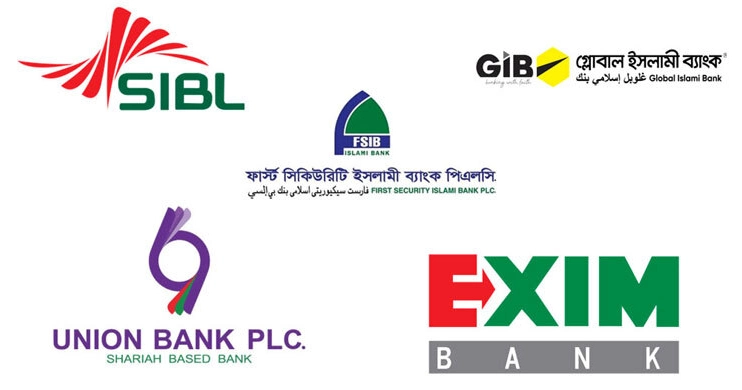Staff Correspondent
Published:2025-06-19 21:53:27 BdST
Depositors of troubled banks still anxious despite security assurances
Abdul Aziz, a middle-aged migrant worker who recently returned from Saudi Arabia, visited the Tangail branch of First Security Islami Bank (FSIB) to withdraw Tk 100,000 for his daughter’s wedding, but the bank provided him with only Tk 25,000.
Aziz, a resident of Ghatail Upazila in Tangail, informed the bank officer of his urgent need. Despite his plea, he was given just a quarter of the amount, citing a cash crisis at the bank.
Talking to this correspondent over the phone, Aziz expressed concern but remained hopeful that the ongoing merger of five Islamic banks, including FSIB, would ease the current liquidity crunch.
Similar incidents have reportedly occurred at the Tangail branches of Union Bank, EXIM Bank and other struggling Islamic banks currently undergoing the merger process.
When contacted, FSIB Chairman Muhammad Abdul Mannan acknowledged the ongoing liquidity issues, saying the merger would protect every depositor’s interest, especially as state ownership would ensure government backing to meet obligations.
Mannan, who also chairs the Islamic Banks Consultative Forum, admitted that many of the banks had previously kept numerous loans classified as ‘regular’ through methods such as rescheduling.
“When I assumed office, FSIB’s non-performing loans (NPLs) were reported at just 4.5 percent. But by December, the bank’s own assessment, following a more rigorous review, placed the figure at 29 percent,” he said.
He explained that the ongoing Asset Quality Review (AQR) considered loan quality, collateral and even the existence of borrowing entities, which led to the sharp rise.
Mannan stressed that government support would be vital for recovery and said merging the five banks into one robust Islamic institution would protect depositors and restore public trust in the banking sector.
Under current regulations, Shariah-compliant Islamic banks must maintain 4 percent of their total deposits as Cash Reserve Ratio (CRR) and 5.5 percent as Statutory Liquidity Ratio (SLR) with the central bank.
Several Islamic banks have failed to meet these requirements since 2022, due to excessive and uncontrolled lending.
Despite this, no significant regulatory action was initially taken. These banks were even permitted to maintain negative balances in their current accounts with the central bank.
But, with Dr Ahsan H. Mansur assuming the role of Bangladesh Bank Governor, such irregular practices have been stopped. To help depositors access their funds, the central bank has even printed money to offer special loans to these banks.
Bangladesh Bank data shows that EXIM Bank received the highest special loan at Tk 8,500 crore. FSIB followed with Tk 7,050 crore, SIBL received Tk 6,675 crore, Global Islami Bank Tk 2,295 crore, and Union Bank Tk 2,400 crore.
The central bank is now moving forward with plans to merge these five ailing Islamic banks into a single, more resilient entity, after uncovering approximately Tk 85,000 crore in previously undisclosed NPLs through the AQR process.
AQR findings have revealed that combined non-performing loans across the five banks now stand at around Tk 1,47,000 crore—equivalent to nearly 77 percent of their total loan portfolios. This has resulted in a massive provision shortfall of Tk 74,501 crore.
Bangladesh Bank had commissioned two international audit firms in January to assess the actual financial condition of six Islamic banks that had become reliant on liquidity support to meet depositor demands.
Ernst & Young is auditing the assets of EXIM Bank, Social Islami Bank (SIBL), and ICB Islamic Bank, while KPMG is reviewing FSIB, Global Islami Bank, and Union Bank. Due to its foreign ownership, ICB Islamic Bank has been temporarily excluded from the merger plan.
Discussions regarding the merger of the remaining five banks took place just before Eid-ul-Azha.
This initiative is part of the newly introduced Bank Resolution Ordinance 2025, which aims to address the challenges faced by weak financial institutions.
The first phase of the merger is expected to conclude between July and October, with five Bangladesh Bank teams assigned to monitor the banks closely.
The audit reports are based on financial indicators as of September and generally align with Bangladesh Bank’s own ‘Quick Summary’ reports for December. However, significant discrepancies exist between the audit findings and the banks’ self-reported figures.
A common pattern is that total loans exceed total deposits—primarily because the banks failed to recover loans while depositors continued to withdraw funds.
Unauthorized use or reproduction of The Finance Today content for commercial purposes is strictly prohibited.


